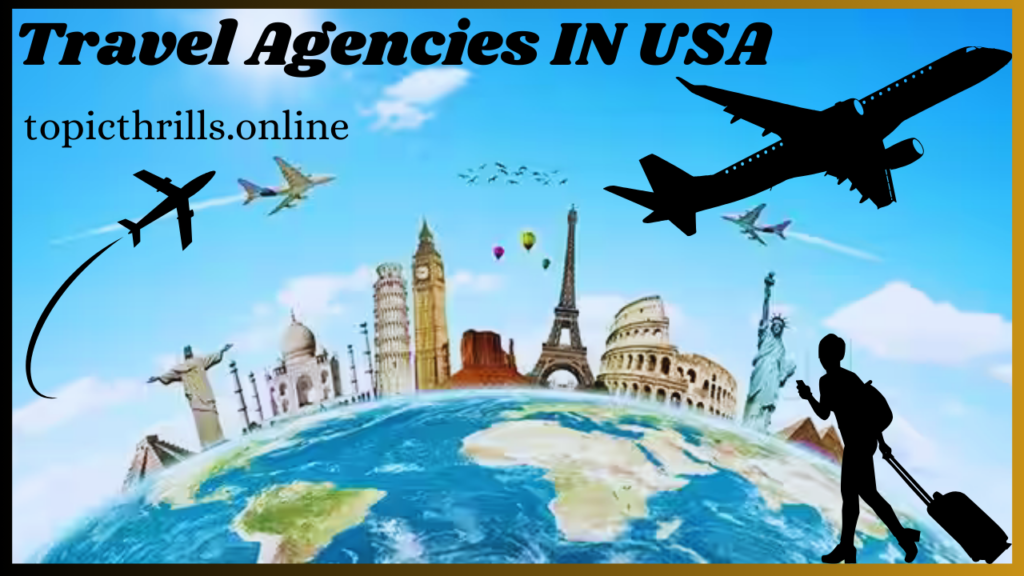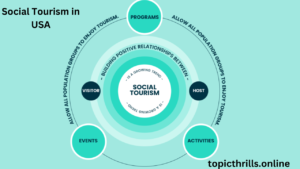Hi there! Have you ever noticed how technology is advancing to make everything around us more intelligent? Guess what, though? Not forgotten are travel agencies! Thanks to all the electronics, they’ve had a really cool makeover.

Let us now discuss the “Impact of Technology on the Travel Agency Business.” We’ll look at how technology has affected travel businesses, from incredibly intelligent apps to virtual reality. It’s as though they’ve switched from utilizing maps to having an online travel companion!
Stay tuned as we explore how technology has enhanced the experience of traveling and how travel firms are embracing this exciting, yet futuristic, world of opportunities and difficulties. Are you prepared to journey through the tech and travel worlds with us? Now let’s move!
Technology Changing the Role of Travel Agents in Travel Agencies:
Not only is technology changing the travel industry, but it’s also changing the fundamental nature of travel agents’ jobs. Travel agencies used to be mainly thought of as middlemen who made reservations. They have become into active orchestrators of smooth, technologically advanced travel experiences nowadays.
The transition from manual to automated operations is one important development. Travel agents may now more efficiently and error-free handle reservations thanks to advanced systems like Global Distribution Systems (GDS) and Computer Reservation Systems (CRS).
In addition to facilitating transactions, travel agents now play a hybrid role as personal concierges and IT specialists. In order to create customized itineraries, provide real-time support, and make recommendations based on personal preferences, travel agents today make use of advanced travel apps and artificial intelligence.
Technology Affected the Travel Agencies:
Technology has had a profound impact on the travel agency sector, changing its environment and impacting every aspect of its business.

Above all, technology has completely changed how reservations are made. The process of booking flights, hotels, tours, and vehicle rentals has been automated and made more efficient by the use of computer reservation systems (CRS) and global distribution systems (GDS). This improves overall efficiency by minimizing errors and speeding up transactions.
As travel apps and online platforms have grown in popularity, the power dynamics between consumers and travel firms have shifted. Travelers now have unparalleled access to data, reviews, and reservation choices. Travel companies have therefore had to change by utilizing technology to offer more individualized, value-added services than what can be found on internet platforms.
From payments to check-ins, contactless solutions are now necessary, particularly in the aftermath of recent international events. This technology contributes to a more seamless and secure travel experience by streamlining procedures in addition to meeting the increasing need for safety.
Components of Travel Agencies Technology:
Modern travel is shaped by a dynamic fusion of various components, each of which is vital to understanding. This is travel agencies technology:
Applications:
Applications for travel have taken center stage in the sector. Applications are designed to meet the various demands of both consumers and travel companies. These needs range from feature-rich travel administration solutions to user-friendly booking interfaces.
Travelers’ planning and execution of their trips are being revolutionized by these apps, which offer tailored experiences, real-time information, and process optimization.
Internets:
Today’s travel technology is built on the Internet. It enables real-time access to information, availability, and reservations by facilitating worldwide connectivity. Travel has become more accessible because to online resources, which enable users to investigate options, evaluate costs, and make well-informed choices.

The Internet is a vital resource for travel firms as it facilitates marketing, communication, and easy integration with international distribution networks.
Computer Systems:
Computer systems, especially Global Distribution Systems (GDS) and Computer Reservation Systems (CRS), are essential to travel technology. Accuracy, effectiveness, and dependability are guaranteed by these technologies, which automate and optimize the entire booking procedure.
For the purpose of managing reservations, keeping track of inventory, and offering a thorough summary of all the available travel alternatives, travel firms rely on reliable computer systems.
Mobile Communications:
Travelers’ interactions with the world have changed as a result of the widespread use of mobile communication. As personal travel aides, smartphones provide fast access to electronic tickets, itineraries, and real-time updates.
Travel agencies use mobile technology to connect with clients at every point of the trip. By offering location-based services, quick help, and vital information, they provide a smooth and engaging travel experience.
Updated and Latest Technologies for Travel Agencies:
In order to offer cutting-edge services and satisfy the ever-changing needs of contemporary passengers, travel firms must be on the bleeding edge of technological advancements.
The following cutting-edge technological advancements will influence how travel firms operate in the future:
GDS:
For travel agencies, GDS technology is still essential. The availability and cost of flights, lodging, and other travel-related services are centralized by these platforms.
Through GDS integration, travel companies are able to offer inexpensive and all-inclusive trip packages by gaining access to a large inventory of possibilities.
Travel Apps:
Both customers and travel firms now rely heavily on travel apps as essential tools. These apps provide easy booking processes, instantaneous updates, and tailored suggestions.
Travel agencies use applications to interact with clients, improve customer service, and expedite the booking process.

AI:
Through intelligent solutions at every touchpoint, artificial intelligence (AI) is transforming the tourism sector. Chatbots are being used for everything from customer service to predictive analytics for pricing strategy optimization.
AI improves customer experience personalization and operational efficiency. Anticipating passenger preferences through data analysis by intelligent algorithms enables agencies to customize their offerings.
Metaverse and Extended Reality:
Extended reality and the metaverse are concepts that the travel industry is beginning to embrace. Customers can virtually explore destinations before making a selection thanks to immersive experiences provided by virtual and augmented reality technologies. By using these technologies for virtual tours, travel companies can improve the pre-trip experience and have an impact on decision-making.
Contactless Check-In and Payments:
Contactless solutions are now essential due to the increased focus on efficiency and safety. In order to reduce physical touchpoints and give passengers a more secure and efficient travel experience, travel agencies are implementing contactless check-in procedures and payment systems.
Virtual Assistants:
AI and natural language processing-driven virtual assistants are now a crucial part of travel industry customer support. These assistants improve client engagement across the travel lifecycle by managing common inquiries, offering prompt assistance, and adding a personalized touch.
FAQS
What are the impacts of technology on travel agencies?
The tourism business has undergone multiple revolutions due to technology. It has facilitated worldwide connectivity, improved client experiences, and expedited booking procedures. Planning a trip is now easier and more individualized thanks to mobile apps, virtual reality, and online booking. In the tourism industry, technology has also enhanced efficiency, safety, and communication.
What technology is used in travel agencies?
Travel agencies make effective use of a variety of technology, such as Global Distribution Systems (GDS) and Computer Reservation Systems (CRS), for booking and reservation administration. Customers can easily navigate travel apps, and artificial intelligence (AI) helps with tailored recommendations. Furthermore, travel firms rely heavily on information technology for web presence, data management, and communication.
What is the role of IT in travel agencies?
An airline’s operations are based on information technology. It stores client data securely, enables contact via email and messaging platforms, and streamlines booking processes through CRS and GDS. Additionally, it makes it possible for travel companies to build a strong online presence and give customers quick access to reservations, information, and real-time changes.
Which tool will I use as a travel agent in travel agencies?
You’ll use a variety of tools and equipment as a travel agent. Customer relationship management (CRM) systems for client interactions, computer systems with access to CRS and GDS, booking management software for travel agencies, and email and messaging apps are a few examples of these. For daily activities, a computer or mobile device and a dependable internet connection are also necessary.
Conclusion
Technology has the power to either make life considerably easier or much more difficult for us. It can make things incredibly frustrating or be the travel agent’s best buddy. Since most cruises and package travel arrangements are still made through travel agencies, technology’s effects are seen every day. Not to mention—though we will—how tourists utilize the Internet, which affects travel companies in both positive and negative ways.
The ability to communicate quickly with all of an agency’s travel partners over high-speed Internet means that booking a trip just takes a few minutes, as opposed to hours. Partners receive reservations quickly, productivity rises, and customer happiness improves—all of which allow them to better plan their workforce. High-speed Internet’s drawback is that consumers are now acting.
In this article, I have written the impact of technology on travel agencies. I think you will find that to be extremely helpful. Contact us via the link on our website if you have any problems. Thanks for reading!





